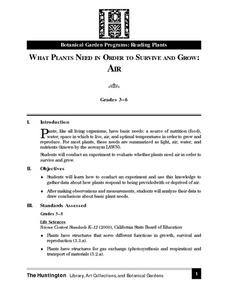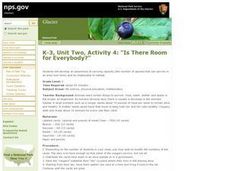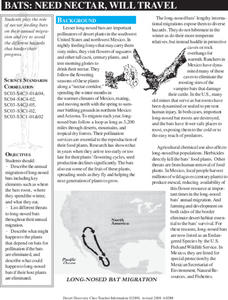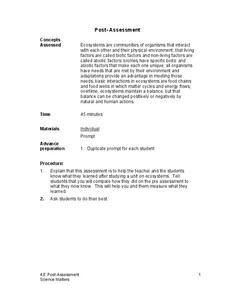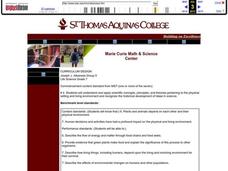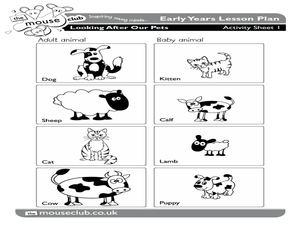ARKive
Darwin and Natural Selection
A presentation on Darwin's theory of evolution and natural selection could be a good addition to your biology class. It provides general information about how animals adapt to their surroundings, as well as how organisms create more...
New York State Department of Environmental Conservation
Adaptations – Designs for Survival
What's the difference between behavioral adaptations and physical adaptations? Learn about the various ways that organisms adapt to their environment with a worksheet about the creatures of the Hudson River.
Curated OER
Basic Needs of Living Things - Lesson Two
Fourth graders study and identify the basic needs of a variety of organisms. Terrariums and aquariums are used to demonstrate what plants, animals, and fish need to stay alive. These two classic models are used to effectively convey what...
Curated OER
Survival Extravaganza
Fifth graders discuss the effects of scarcity. In this survival lesson plan, 5th graders use strategies that would help them survive in a survival situation. Students write letters about bears in need of help to survive. Students answer...
Curated OER
What Plants Need in Order to Survive and Grow: Air
Students conduct an experiment to determine whether plants need air in order to survive and grow. They discuss natural resources, analyze slides, and observe and record data from the experiment.
Curated OER
What Plants Need in Order to Survive and Grow: Soil
Students conduct an experiment to evaluate whether plants need soil to survive and grow. They plant two seeds, one with soil and one without, make predictions, and record and analyze the seed germination results on a worksheet.
Curated OER
Is There Room for Everybody?
Third graders examine the capacity of animals able to live in one habitat. In this habitat lesson plan, 3rd graders play a game that shows the food chain and the interactions between animals in an area. Students discover that food is a...
Channel Islands Film
Dark Water: Lesson Plan 2 - Grade 3
A discussion of bioluminescence launches an investigation of animal adaptations. After re-watching the opening minutes of Dark Water, class members listen to a reading of What Do You Do with a Tail Like This, and then create a new animal...
Curated OER
Do You Need What I Need?
Student identify the basic human needs. In this life science lesson, 3rd graders compare the needs of plants, animals and humans. They apply what they have learned by playing a survival team game.
Curated OER
Crustacean Critters
Students explore the habitats of hermit crabs. In this crustacean lesson, students discover what animals need to survive. Working with live hermit crabs, students explore how hermit crabs have adapted to their habitats.
Curated OER
Responses to Changes in the Environment
Fourth graders study ecosystems, and see how plants and animals must adapt to changes in their environment in order to survive. Pictures of the snow shoe hare in the winter and summer are shown. Learners determine that the change in...
Columbus City Schools
Get Your Organisms Organized
From large to small, show your class how to organize them all! Included within the guide is everything you need to take their knowledge of classification from the cellular to the species level. The worksheets focus on building vocabulary...
Curated OER
Cycles and Starting Mealworms
Here is a fascinating lesson about the life cycles of plants and animals, and other cycles found in nature. Learners explore the cycle of the moon, the tides, and other sequences of events in every day life. The big activity is the...
Curated OER
Bats: Need Nectar, Will Travel
Beginning wildlife biologists become adult bats, baby bats, snakes, owls, bobcats, or land-clearing developers in a grand role-playing activity. In a large open space, they play a game in which they move to designated areas based on what...
National Wildlife Federation
What's Your Habitat?
How are third graders like rabbits? They both live in habitats and require food, water, and shelter to survive! An educational science lesson encourages your learners to think about their own habitats and survival needs, before comparing...
Science Matters
Post-Assessment
Twenty questions make up an assessment designed to test super scientists' knowledge of ecosystems. Scholars answer multiple-choice and short-answer questions about organisms, food chains, energy flow, and more.
Curated OER
Winter Survival
Students create a list of the five most important things they need to survive a winter night. In this survival lesson, students work in groups to list things they would need to survive a night outside in winter. Students remove items...
Curated OER
Researching Polar Animals
Second graders read the questions about polar animals and use the Internet to perform a search for the answers to the questions. They click on the blue links to go to the particular website with the answers and then print off their sheet.
Curated OER
Plants and Animals
Seventh graders discover the interconnectedness of plants and animals in ecosystems. In groups, they create a food web and discuss the problems when one link of the chain is broken. To end the lesson, they set up a balanced environment...
Virginia Department of Education
Molar Heat of Fusion for Water
How can you describe heat of fusion in a way the class understands and relates the importance of this concept to present day issues? In this third activity of the series, learners conduct an experiment, demonstrating the flow of heat...
Michigan State University
May I Take Your Order?
If you're a pest, come and get a tasty meal here! Scholars work collaboratively to construct a mini restaurant out of a shoe box and create a menu that feeds a pest their favorite food.
Curated OER
Nowhere to Hide
Young scholars examine the topic of natural selection. As a class, they write their own definition to survival of the fittest and watch a video. Using the internet, they research how Darwin started to examine this process using finches...
Curated OER
Education: Passing Enough Knowledge to Survive to the Next Generation
Students compare and contrast the knowledge requirements for human and animal children. They identify the consequences of an animal if it is unprepared for the given environment. They discover the importance of education as well.
Curated OER
Looking After Our Pets
Students explore animal lifestyles by illustrating images. In this pet care lesson, students discuss their own pets and the conditions animals need to survive in both nature or a home. Students draw snakes and complete an activity sheet...






